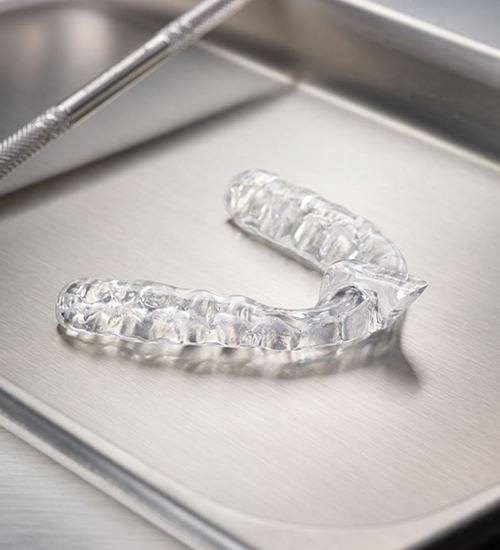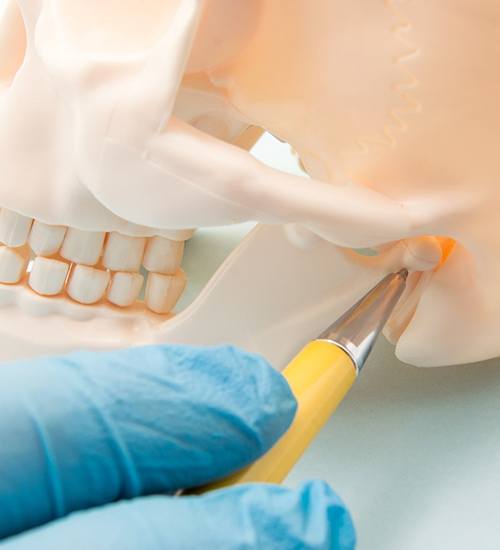
TMJ Therapy – San Ramon, CA
Address Jaw Stiffness & Pain
Millions of Americans suffer from chronic facial pain. Most are unaware that their condition is dental related. Dr. Deol specializes in the diagnosis and treatment of TMJ (temporomandibular joint dysfunction). With an oral appliance or stress-relief treatments, we offer effective TMJ therapy in our San Ramon, CA dental office, to alleviate your nagging pain.
TMJ Referrals - Scan Here

Why Choose Oak Ridge Dental for TMJ Therapy?
- Customized, Pain-Relieving TMD Therapy
- Dentist with Years of Experience Treating TMD
- We Accept Dental Insurance
Diagnosis & Treatment

While the exact cause of TMJ is unknown and contributing factors vary, the disorder often results from injury or stress. Other causes include genetics, hormones, arthritis, and auto-immune disease. The most common symptom is frequent headaches. Other symptoms of TMJ include:
- Neck, back, and shoulder pain
- Earaches without infection
- Sensitive, worn, or cracked teeth
- Clicking or popping in the jaw
- Inability to open mouth fully
- Uncomfortable bite, clenching, or grinding
Dr. Deol may be able to alleviate your pain with TMJ therapy. After a thorough examination, he will determine the type of therapy that will benefit you most effectively. Each patient is unique, but treatment may include an oral appliance, muscle relaxants, or tooth reshaping. For many, treatment is completed in as little as three to six months.
Equilibration/Occlusal Adjustments

An equilibration or occlusal adjustment is a minor, non-invasive procedure where we will slightly adjust your teeth so they come together more evenly, dispersing force equally on both jaw joints. This will keep one joint from having to do more work than the other, which can result in facial pain, jaw tension, and teeth grinding. Before we start making adjustments, we’ll take an impression of your teeth to find any areas of your bite that hit harder than other locations and gently buff them down to make sure that this doesn’t happen anymore.
Occlusal Splints

An occlusal splint is a custom-designed orthotic device that you can wear in your mouth while you sleep to gently and gradually shift your jaw into alignment. It also serves an additional purpose of protecting your teeth from nightly grinding and clenching, also known as bruxism. As the splint is worn on a nightly basis, you’ll start to feel relief from all of the uncomfortable TMD symptoms you’ve been experiencing, such as earaches, migraines, and neck and shoulder pain.
Nightguards for Bruxism

Do you wake up with a sore mouth or dull headache? These are common signs that you may be grinding your teeth as you sleep at night. Although it may not sound like a threatening problem, it is. Over time, this constant force and pressure being placed on your teeth can result in dental damage, fractures, and enamel erosion. To keep your smile healthy and unaffected by this habit, we offer custom-crafted nightguards for nightly teeth grinding, also known as bruxism. They’re made from a cushioned, durable acrylic material that is able to withstand daily use.
Trigger Point Injections

A trigger point is a small portion of a muscle that can be extremely sensitive or painful, and one can develop in the TMJ area as a result of excess tension, strain, or injury. Rather than treating the entire muscle, a small amount of local anesthetic can be injected into the trigger point to soothe the discomfort and jumpstart healing. The anesthetic may be mixed with a steroidal medication to speed up the process, and you might be given daily jaw stretches to help with long-term relief as well.
TMJ Therapy FAQs

Dr. Deol and our team are ready to consult with you so you can get on the road to owning a healthy and pain-free TMJ in San Ramon. Before you contact us to schedule your consultation, though, you may want to learn more about your condition and what to expect on the road ahead. To help you out, we have put together a brief list of FAQs about TMD, along with succinct answers. If you don’t see the information you were hoping for, give us a call. We look forward to speaking with you!
Will My TMD Go Away on Its Own?
Some individuals find that in time, their TMD symptoms subside without treatment. However, that does not mean that the underlying cause of the condition has been resolved. You may still have a misaligned bite or other problems that require treatment. Without professional care, your symptoms may continue to recur multiple times in the future.
Who Is Most At-Risk for Developing TMD?
The group that is most likely to suffer from TMD is women of childbearing age. This may be because of hormonal differences between the sexes, or it could boil down to slight anatomical variations between the jaws of men and women.
Of course, TMD can afflict almost anyone, including men. Those who are particularly at risk include individuals with a stressful lifestyle, those who have suffered facial injuries, people with orthodontic problems, and individuals who suffer from arthritis.
Will I Need Surgery to Correct My TMD?
Surgery is usually regarded as a last resort when it comes to treating TMD. In most cases, more conversative therapies are effective at providing long-lasting pain relief. If, after we have thoroughly evaluated your circumstances and tried common ways of addressing your pain, we determine that surgery may be necessary in your case, we will refer you to a specialist who is qualified to help you.
What Are Some Steps I Can Take at Home to Relieve TMD Pain?
While at-home remedies may not be able to address the underlying cause of your TMD, they may be able to provide some symptom relief. Here are some practical things you can do:
- Take over the counter pain relievers
- Massage your face
- Use heat/cold therapy to relax your facial muscles and dull your discomfort
- Stick to eating soft foods
- Do not chew gum
- Make sure your posture is correct
Can TMD Cause Migraines?
TMD is strongly associated with recurring migraines. It may not always be the direct cause of the migraines (migraines are a complex neurological condition with many potential causes). However, it may trigger migraine episodes. Many people who undergo TMJ therapy find that their migraines decrease in frequency and severity.
How Long Does It Take for an Occlusal Splint to Work?
An occlusal splint is meant to be worn at night so that it can keep your jaw in a position that won’t put an excessive amount of strain on your jaw joints. It typically won’t be long before you notice some level of improvement, and many patients experience a significant reduction of their symptoms after roughly six weeks. That said, it can take quite a bit longer for your occlusal splint to help you achieve full relief from your TMJ-related symptoms – often between three and six months.
How Long Does Occlusal Adjustment Take for TMJ Disorder?
Occlusal adjustment involves making small changes to your teeth so that they come together properly, thus ensuring that your jaw joint isn’t exposed to too much pressure when you bite or chew. The process can often be completed in just one to three relatively short visits. Once the treatment is done, it shouldn’t be too long before you start experiencing relief. Of course, the timeline can vary from patient to patient depending on the nature of the adjustments needed.
Is TMJ Treatment Safe?
The short answer is yes, TMJ treatment is largely considered safe for the vast majority of patients. Of course, this is assuming that said treatment is carried out by a trustworthy, highly trained professional.
Remember that while TMJ disorder can sometimes be treated via surgery, this approach inherently carries some level of risk. As such, your dentist will always recommend minimally invasive and conservative forms of TMJ treatment whenever possible.
Does Occlusal Adjustment for TMJ Disorder Hurt?
The occlusal adjustment process often requires removing small amounts of enamel from specific teeth. Thus, you may be worried about discomfort during the treatment. Rest assured, though, that we will always take whatever steps we can to ensure that you stay as comfortable as possible in the dental chair.
In many cases, we can apply a local anesthetic prior to beginning your occlusal adjustment. This will help ensure that your mouth stays numb while we work on your teeth. In the days following your treatment, you may experience some soreness in your mouth, but it will be relatively mild and should go away on its own eventually.
Is TMJ Treatment Covered by Insurance?
The answer to this question won’t be exactly the same for every patient. Some insurance companies will not offer coverage for TMJ treatment outside of a state mandate. Others may be willing to help pay for such services, but they might only cover certain procedures. It’s a good idea to reach out to your insurance carrier to clarify whether you can use your benefits to make the cost of TMJ treatment more manageable.



